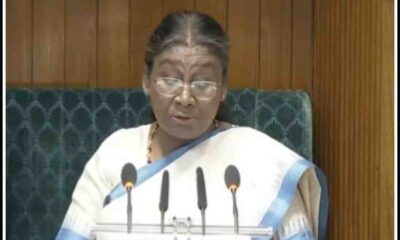Education
Jamia Millia Islamia to Delhi High Court: “Quota For Poor Not Applicable”
Published
1 year agoon

The high court had previously served notices on the petition on Jamia, the Ministry of Education, and the University Grants Commission (UGC) and sought their responses.
The Jamia Millia Islamia University informed the Delhi High Court on Tuesday that it was designated as a minority educational institution in 2011 and that the provision of 10% reservation for students from the economically weaker section (EWS) will not apply to it.
The oral submissions were made on behalf of the university in a petition asking for directions to ensure 10% reservation for students from the EWS category at the time of admission beginning in the academic year 2023-24.
Read Also:- Indian students are restricted at 5 Australian universities due to an increase in fraud applications.
The university was given two weeks to submit its response to the petition by a bench of Chief Justice Satish Chandra Sharma and Justice Yashwant Varma, and the case was set for further hearing on May 22.
Akanksha Goswami, a law student, filed a public interest litigation (PIL) alleging that the Constitution (103rd Amendment) Act of 2019’s 10% reservation for EWS category students in higher education and government jobs requires the university to hold seats aside for them at the time of admission beginning with the academic year 2023–2024.
Senior attorney Arun Bhardwaj made the argument on behalf of the petitioner that Jamia could either be a central university or a minority institution, but not both
He stated that the application process started in April and would last until September.In 2011, the National Commission for Minority Educational Institutions issued an order designating Jamia as a minority educational institution, according to the university’s standing attorney, Pritish Sabharwal.
He claimed that Jamia is covered by a government notification from 2019 that stated minority institutions would not be subject to the office memorandum enabling the provision of 10% reservation for EWS students in admission to educational institutions.Prior to this, the high court requested responses from JMI , the Ministry of Education, and the University Grants Commission (UGC) regarding the petition.The petitioner’s attorney had earlier argued that because Jamia is a central university and receives funding from the UGC, Jamia should be ordered to implement the EWS reservation.
The petitioner claimed Jamia Millia Islamia was established by a Parliamentary act and is therefore a central university and not a minority institution. The petitioner was also represented by attorneys Akash Vajpai and Ayush Saxena.
The argument made in the petition claimed that the UGC had already sent a letter, implementing the reservation for EWS students, to the registrars of all central universities, including Jamia.
“In its letter dated January 18, 2019, respondent no. 2 (UGC) requested all vice-chancellors of central universities, including respondent no. 1 (Jamia), to implement 10% EWS reservation at the time of admission in their various courses beginning in the academic year 2019-2020.” “On February 5, 2019, respondent no. 1 Jamia Millia Islamia issued a press release in which it refused to implement the 10% EWS reservation, citing its status as a minority institution under Article 30 of the Indian Constitution,” the plea stated.
In addition to the reservation issue, the petitioner has asked the court to vacate an order issued by the National Commission for Minority Educational Institutions that designated Jamia as a minority institution.According to the petition, Jamia was neither founded by a minority community nor is it administered by one, as it was established by an Act of Parliament and is also funded by the Government of India.
Additionally, it stated that treating a central university as a minority educational institution is against the law and that there is no provision in the Jamia Millia Islamia Act, 1988, to allow the selection of only Muslims as members of its executive and academic council.
“Respondent No. 1 (Jamia), after it was incorporated and established through the Jamia Millia Islamia Act, 1988, became another central university in the country like the Banaras Hindu University and the Allahabad University,” the plea claimed.
Credent TV Editorial Team

You may like
-


North Korea asserts that the test of a multiple-warhead missile was successful
-


The Student Wing of Congress storms the Exam Body NTA office and locks it from within
-


“During President Murmu’s address to Parliament, PM Modi was shown 73 times, and LoP Rahul Gandhi was shown six times”: Congress
-


NASA contracts Elon Musk’s SpaceX to deorbit the International Space Station in 2023.
-


A Caution For The CBI In The Delhi Court’s Arvind Kejriwal Custody Order
-


Bar Council of India requests that bar associations abstain from demonstrating in opposition to new criminal laws